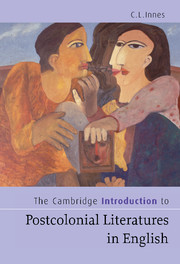Book contents
- Frontmatter
- Contents
- Preface
- Chapter 1 Introduction: situating the postcolonial
- Chapter 2 Postcolonial issues in performance
- Chapter 3 Alternative histories and writing back
- Chapter 4 Authorizing the self: postcolonial autobiographical writing
- Chapter 5 Situating the self: landscape and place
- Chapter 6 Appropriating the word: language and voice
- Chapter 7 Narrating the nation: form and genre
- Chapter 8 Rewriting her story: nation and gender
- Chapter 9 Rewriting the nation: acknowledging economic and cultural diversity
- Chapter 10 Transnational and black British writing: colonizing in reverse
- Chapter 11 Citizens of the world: reading postcolonial literature
- Notes
- Glossary of terms used (compiled by Kaori Nagai)
- Biographies of selected postcolonial writers (compiled by Kaori Nagai)
- Brief colonial histories: Australia, the Caribbean, East Africa, India and Pakistan, Ireland, West Africa (compiled by Kaori Nagai)
- Select bibliography
- Index
Chapter 8 - Rewriting her story: nation and gender
Published online by Cambridge University Press: 05 June 2012
- Frontmatter
- Contents
- Preface
- Chapter 1 Introduction: situating the postcolonial
- Chapter 2 Postcolonial issues in performance
- Chapter 3 Alternative histories and writing back
- Chapter 4 Authorizing the self: postcolonial autobiographical writing
- Chapter 5 Situating the self: landscape and place
- Chapter 6 Appropriating the word: language and voice
- Chapter 7 Narrating the nation: form and genre
- Chapter 8 Rewriting her story: nation and gender
- Chapter 9 Rewriting the nation: acknowledging economic and cultural diversity
- Chapter 10 Transnational and black British writing: colonizing in reverse
- Chapter 11 Citizens of the world: reading postcolonial literature
- Notes
- Glossary of terms used (compiled by Kaori Nagai)
- Biographies of selected postcolonial writers (compiled by Kaori Nagai)
- Brief colonial histories: Australia, the Caribbean, East Africa, India and Pakistan, Ireland, West Africa (compiled by Kaori Nagai)
- Select bibliography
- Index
Summary
The first chapter of Midnight's Children (1981) is entitled ‘The Perforated Sheet’, referring to the sheet with its small circular hole through which Dr Aziz was expected to diagnose, treat, and then court Saleem's grandmother, Naseem, while she remained in purdah. Gradually, we are told, ‘Doctor Aziz came to have a picture of Naseem in his mind, a badly-fitting collage of her severally-inspected parts. This phantasm of a partitioned woman began to haunt him, and not only in his dreams. Glued together by his imagination, … she moved into the front room of his mind.’ The image of ‘a partitioned woman’, a figure ‘glued together by the imagination’ becomes a metaphor for the imagined Indian subcontinent as a whole, made up of many disparate cultures, languages and faiths, and partitioned in 1947, remaining even now bitterly divided over Kashmir, where Naseem and Aadam Aziz first meet. As a female figure who dominates the imagination, Naseem will be supplanted later in the novel by Indira Gandhi, who seeks to create an identification between India and herself (‘Indira is India, India is Indira’), and also by Padma, an intermediary for the writer's imagined audience. Rushdie's later novel The Moor's Last Sigh (1995) makes frequent reference to the image of ‘Mother India’ and to the famous 1957 film with that title, replacing the devout peasant mother featured in the film with, as he describes his protagonist Aurora, his ‘own sort of Mother India … metropolitan, sophisticated, noisy, angry and different’.
- Type
- Chapter
- Information
- Publisher: Cambridge University PressPrint publication year: 2007

